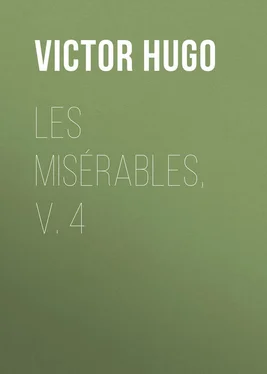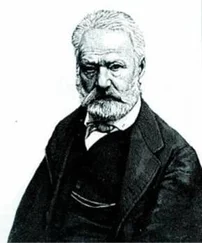Victor Hugo - Les Misérables, v. 4
Здесь есть возможность читать онлайн «Victor Hugo - Les Misérables, v. 4» — ознакомительный отрывок электронной книги совершенно бесплатно, а после прочтения отрывка купить полную версию. В некоторых случаях можно слушать аудио, скачать через торрент в формате fb2 и присутствует краткое содержание. Жанр: literature_19, foreign_antique, foreign_prose, на английском языке. Описание произведения, (предисловие) а так же отзывы посетителей доступны на портале библиотеки ЛибКат.
- Название:Les Misérables, v. 4
- Автор:
- Жанр:
- Год:неизвестен
- ISBN:нет данных
- Рейтинг книги:4 / 5. Голосов: 1
-
Избранное:Добавить в избранное
- Отзывы:
-
Ваша оценка:
- 80
- 1
- 2
- 3
- 4
- 5
Les Misérables, v. 4: краткое содержание, описание и аннотация
Предлагаем к чтению аннотацию, описание, краткое содержание или предисловие (зависит от того, что написал сам автор книги «Les Misérables, v. 4»). Если вы не нашли необходимую информацию о книге — напишите в комментариях, мы постараемся отыскать её.
Les Misérables, v. 4 — читать онлайн ознакомительный отрывок
Ниже представлен текст книги, разбитый по страницам. Система сохранения места последней прочитанной страницы, позволяет с удобством читать онлайн бесплатно книгу «Les Misérables, v. 4», без необходимости каждый раз заново искать на чём Вы остановились. Поставьте закладку, и сможете в любой момент перейти на страницу, на которой закончили чтение.
Интервал:
Закладка:
A certain amount of reverie is good, like a narcotic taken in discreet doses. It lulls to sleep the at times harsh fevers of the working brain, and produces in the mind a soft and fresh vapor which correct the too sharp outlines of pure thought, fills up gaps and spaces here and there, and rounds the angles of ideas. But excess of reverie submerges and drowns, and woe to the mental workman who allows himself to fall entirely from thinking into reverie! He believes that he can easily rise again, and says that, after all, it is the same thing. Error! Thought is the labor of the intellect, and reverie its voluptuousness; substituting reverie for thought is like confounding a person with his nutriment. Marius, it will be remembered, began with that; passion arrived, and finished by hurling him into objectless and bottomless chimeras. In such a state a man only leaves his home to go and dream, and it is an indolent childishness, a tumultuous and stagnant gulf, and in proportion as work diminishes, necessities increase. This is a law; man in a dreamy state is naturally lavish and easily moved, and the relaxed mind can no longer endure the contracted life. There is, in this mode of existence, good mingled with evil, for if the softening be mournful, the generosity is healthy and good. But the poor, generous, and noble-minded man who does not work is ruined; the resources dry up, and necessity arises. This is a fatal incline, on which the most honest and the strongest men are dragged down like the weakest and the most vicious, and which leads to one of two holes, – suicide or crime. Through going out to dream, a day arrives when a man goes out to throw himself into the water. Excess of dreaminess produces such men as Escousse and Libras. Marius went down this incline slowly, with his eyes fixed upon her whom he no longer saw. What we have just written seems strange, and yet it is true, – the recollection of an absent being is illumined in the gloom of the heart; the more it disappears the more radiant it appears, and the despairing and obscure soul sees this light on its horizon, the star of its inner night. She was Marius's entire thought, he dreamed of nothing else. He felt confusedly that his old coat was becoming an outrageous coat, and that his new coat was growing an old coat, that his boots were wearing out, that his hat was wearing out, that his shirts were wearing out, – that is to say, that his life was wearing out; and he said to himself, Could I but see her again before I die!
One sole sweet idea was left him, and it was that she had loved him, that her glance had told him so; and that she did not know his name but that she knew his soul, and that however mysterious the spot might be where she now was, she loved him still. Might she not be dreaming of him as he was dreaming of her? At times in those inexplicable hours which every loving heart knows, as he had only reason to be sad, and yet felt within him a certain quivering of joy, he said to himself, "Her thoughts are visiting me," and then added, "Perhaps my thoughts also go to her." This illusion, at which he shook his head a moment after, sometimes, however, contrived to cast rays which resembled hope into his soul at intervals. Now and then, especially at that evening hour which most saddens dreamers, he poured out upon virgin paper the pure, impersonal, and ideal reveries with which love filled his brain. He called this "writing to her." We must not suppose, however, that his reason was in disorder, quite the contrary. He had lost the faculty of working and going firmly toward a determined object, but he retained clear-sightedness and rectitude more fully than ever. Marius saw by a calm and real, though singular, light, all that was taking place before him, even the most indifferent men and facts, and spoke correctly of everything with a sort of honest weariness and candid disinterestedness. His judgment, almost detached from hope, soared far above him. In this state of mind nothing escaped him, nothing deceived him, and he discovered at each moment the bases of life, – humanity and destiny. Happy, even in agony, is the man to whom God has granted a soul worthy of love and misfortune! He who has not seen the things of this world and the heart of man in this double light has seen nothing of the truth and knows nothing.
The soul that loves and suffers is in a sublime state.
Days succeeded each other, and nothing new occurred; it really seemed to him that the gloomy space which he still had to traverse was becoming daily reduced. He fancied that he could already see distinctly the brink of the bottomless abyss.
"What!" he repeated to himself, "shall I not see her again before that takes place?"
After going up the Rue St. Jacques, leaving the barrière on one side, and following for some distance the old inner boulevard, you reach the Rue de la Santé, then the Glacière, and just before coming to the small stream of the Gobelins, you notice a sort of field, the only spot on the long and monotonous belt of Parisian boulevards, where Ruysdael would be tempted to sit down. I know not whence the picturesque aspect is obtained, for you merely see a green field crossed by ropes, on which rags hang to dry; an old house built in the time of Louis XIII., with its high-pitched roof quaintly pierced with garret-windows; broken-down grating; a little water between poplar trees; women's laughter and voices; on the horizon you see the Pantheon, the tree of the Sourds-Muets, the Val de Grâce, black, stunted, fantastic, amusing, and magnificent, and far in the background the stern square towers of Notre Dame. As the place is worth the trouble of visiting, no one goes there; scarce a cart or a wagon passes in a quarter of an hour. It once happened that Marius's solitary rambles led him to this field, and on that day there was a rarity on the boulevard, a passer-by. Marius, really struck by the almost savage grace of the field, asked him: "What is the name of this spot?"
The passer-by answered, "It is the Lark's field;" and added, "It was here that Ulbach killed the shepherdess of Ivry."
But, after the words "the Lark," Marius heard no more, for a word at times suffices to produce a congelation in a man's dreamy condition: the whole thought is condensed round an idea, and is no longer capable of any other perception. The Lark, that was the appellation which had taken the place of Ursule in the depths of Marius's melancholy. "Stay," he said, with that sort of unreasoning stupor peculiar to such mysterious asides, "this is her field, I shall learn here where she lives." This was absurd but irresistible, and he came daily to this Lark's field.
CHAPTER II
CRIMES IN EMBRYO INCUBATED IN PRISONS
Javert's triumph at the Maison Gorbeau had seemed complete, but was not so. In the first place, and that was his chief anxiety. Javert had not been able to make a prisoner of the prisoner; the assassinated man who escapes is more suspicious than the assassin, and it was probable that this personage, such a precious capture for the bandits, might be an equally good prize for the authorities. Next, Montparnasse slipped out of Javert's clutches, and he must wait for another opportunity to lay hands on that "cursed dandy." Montparnasse, in fact, having met Éponine on the boulevard, keeping watch, went off with her, preferring to play the Nemorino with the daughter rather than Schinderhannes with the father, and it was lucky for him that he did so, as he was now free. As for Éponine, Javert "nailed" her, but it was a poor consolation, and sent her to join Azelma at the Madelonnettes. Lastly, in the drive from No. 50-52 to La Force, one of the chief men arrested, Claquesous, had disappeared. No one knew how he did it, and the sergeants and agents did not at all understand it; he had turned into vapor, slipped through the handcuffs, and passed through a crack in the coach; but no one could say anything except that on reaching the prison there was no Claquesous. There was in this either enchantment or a police trick. Had Claquesous melted away in the darkness like a snow-flake in the water? Was there an unavowed connivance on the part of the agents? Did this man belong to the double enigma of disorder and order? Had this Sphynx its front paws in crimes, and its hind paws in the police? Javert did not accept these combinations, and struggled against such compromises; but his squad contained other inspectors besides himself, and though his subordinates, perhaps more thoroughly initiated in the secrets of the Préfecture, and Claquesous was such a villain that he might be a very excellent agent. To be on such intimate juggling relations with the night is excellent for plunder and admirable for the police, and there are double-edged rogues of the sort. However this might be, Claquesous was lost and could not be found, and Javert seemed more irritated than surprised. As for Marius, "that scrub of a lawyer who was probably frightened," and whose name he had forgotten, Javert did not trouble himself much about him, and besides, a lawyer can always be found. But, was he only a lawyer?
Читать дальшеИнтервал:
Закладка:
Похожие книги на «Les Misérables, v. 4»
Представляем Вашему вниманию похожие книги на «Les Misérables, v. 4» списком для выбора. Мы отобрали схожую по названию и смыслу литературу в надежде предоставить читателям больше вариантов отыскать новые, интересные, ещё непрочитанные произведения.
Обсуждение, отзывы о книге «Les Misérables, v. 4» и просто собственные мнения читателей. Оставьте ваши комментарии, напишите, что Вы думаете о произведении, его смысле или главных героях. Укажите что конкретно понравилось, а что нет, и почему Вы так считаете.












